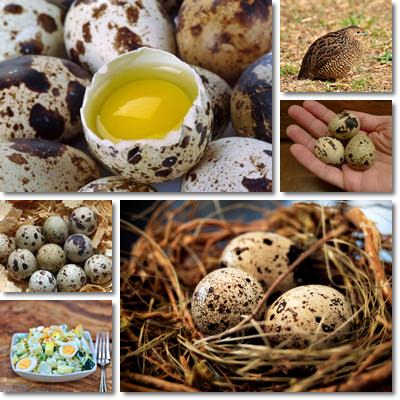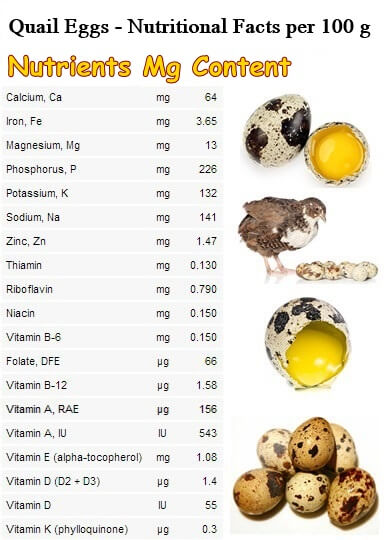Nutritional and Health benefits of quail eggs

Quail eggs are eggs laid by various species of quail. Quail are mid-sized birds found in Europe, North Africa, the southern United States, and some parts of Asia.
They are known for the numerous health benefits they provide.
The most important health benefits of quail eggs include their ability to improve vision, boost energy levels, stimulate growth and repair, improve metabolism, reduce blood pressure, soothe allergies, cleanse the body, and prevent chronic diseases.
Quail eggs are about just as nutritious as chicken eggs, in some ways only slightly more nourishing and are best eaten in moderation. Here are the most relevant properties and health benefits of quails eggs:
1) Less allergenic than chicken and other eggs.
2) Good for anemia thanks to a good iron content.
3) Easy on the stomach, good food for gastritis and other digestive disorders.
4) High in protein for building muscle and losing weight.
5) Contain all essential amino acids for brain and nervous system health.
6) Potential benefits for brain fog, mood swings, memory, supports learning.
7) Promote brain development in babies in the uterus.
8) Help prevent neural tube defects of the brain, spine and spinal cord.
As a result of a high vitamin B12 content.
9) Have vitamin B12 and cholesterol for healthy nerve cells.
Lower risk of demyelination (loss of the protective myelin coating surrounding nerve cells) and potentially lower risks for multiple sclerosis and other degenerative diseases of the nervous system.
10)Boost immunity thanks to a good vitamin D content.
11) Promote strong bones and teeth as a result of a good phosphorus content.
12) Strong hair thanks to a high protein content.
13) Potential benefits for eczema and psoriasis.
14) Potential benefits for allergic rhinitis and asthma.
15) Quails eggs promote fertility and support pregnancy.
16) Benefits for high blood sugar levels.
17) Antioxidant properties from vitamin A, good for skin and eyesight.
Most of these benefits are a result of a high nutritional value. Here are the most prominent nutrition facts of quail eggs:
1) Vitamin B1 (thiamine): 0.130 mg, about 11% of the recommended daily intake, RDI.
2) Vitamin B2 (riboflavin): 0.790 mg, more than 50% of the RDI.
3) Vitamin B6: 0.150 mg out of the total 1.7 mg needed, almost 10% of RDI.
4) Vitamin B12: 16 quail eggs, 10 g per egg, provide 100% of the RDI.
5) Vitamin D: 55 IU of the total 400 IU, around 25% of the RDI.
6) Vitamin A: 156 mcg/100 g, out of the 900 mcg RDI.
7) Iron: 3.65 mg out of the 18 mg needed, about 20% of RDI.
8) Phosphorus: 226 mg out of the 1250 mg needed, about 20% of RDI.
9) Sodium: 141 mg, out of the 2300 mg maximum intake.
10) Small amounts of calcium, magnesium, potassium, zinc, vitamins B3 and B9.
Other purported health benefits of eating quail eggs.
1) Quail eggs and diabetes. Quail eggs are best known for their anti-diabetes benefits. But this is only a half-truth. Quail eggs do not treat diabetes. They may however help control blood sugar levels. This is because they are high in fats and protein, both of which take longer to digest. The longer digestion time means blood sugar levels overall will raise more slowly and constantly, contributing to better blood sugar control. And this is where the benefits come from. If you are diabetic, talk to your doctor first before introducing quail eggs into your diet.
Below you can see the nutritional table with vitamin and mineral values for 100 g of quail eggs.

2) Quail eggs, fats and cholesterol. First, let’s debunk the myth: quail eggs have cholesterol, more than chicken eggs. And it’s the same type: the only one there is in animal products.
Chicken vs quail eggs cholesterol content:
100 g of quail eggs (11 eggs, 9 g per egg) have 844 mg of cholesterol.
100 g of chicken eggs (2 medium to large eggs, 50 g per egg) 373 mg of cholesterol.
1 quail egg (9 g) has 76 mg of cholesterol.
1 chicken egg (50 g) has 186 mg of cholesterol.
Chicken vs quail eggs fat content:
– 10.6 g of fat/100 g of chicken eggs
– 11.09 g of fat/100 g of quail eggs
But despite their high fat and cholesterol content, quail eggs remain healthy when eaten in moderate amounts, as part of a varied and balanced diet. So if you are already eating plenty of animal products, processed foods, sweets and have a high intake of fats and cholesterol, eating quail eggs might not be good for you because it adds to the excess. If you have a clean diet, quail eggs can be a healthy choice. Because, as research shows, cholesterol from food does not directly raise blood cholesterol levels. But if you are already overweight and have high blood cholesterol levels and existing heart disease, then adding more high-fat, high-cholesterol foods to your diet is not healthy for you.
3) Quails eggs and salmonella risks. The reason why quails eggs are reported to pose lower risks of salmonella infections is because of the birds’ higher body temperature which theoretically does not allow Salmonella bacteria to thrive and multiply. However, over the years there have been numerous reports of quail eggs being contaminated with various pathogenic Salmonella bacteria.
Contamination may occur because of improper hygiene at the farms, contact of quails with other infected birds, improper handling of the eggs, including breaking the eggs or contact with other contaminated eggs, contaminated feed, higher heat resistance of certain strains or other reasons. And while it’s more likely the bacteria are present on the shell as a result of cross-contamination, not inside the egg, know there is still a risk, albeit lower than in the case of chicken or duck eggs.
Because quails eggs can be carriers of Salmonella bacteria, it is recommended to take precautions such as:
– Get your quail eggs from safe sources.
– Discard broken or cracked eggs or eggs with blood, dirt or dried waste.
– Check the expiration date and avoid eggs kept at room temperature.
– Keep eggs refrigerated at all times at low temperatures.
– Avoid eating raw or undercooked quail eggs, especially if you are pregnant.
– Do not give raw or undercooked eggs to children, the elderly or chronically ill people.
– If frying, turn quail eggs on both sides or cover pan with a lid to ensure uniform cooking.
What do you think about this piece? Share your comment in the comment thread and share the story using the social media buttons above. Thank you.